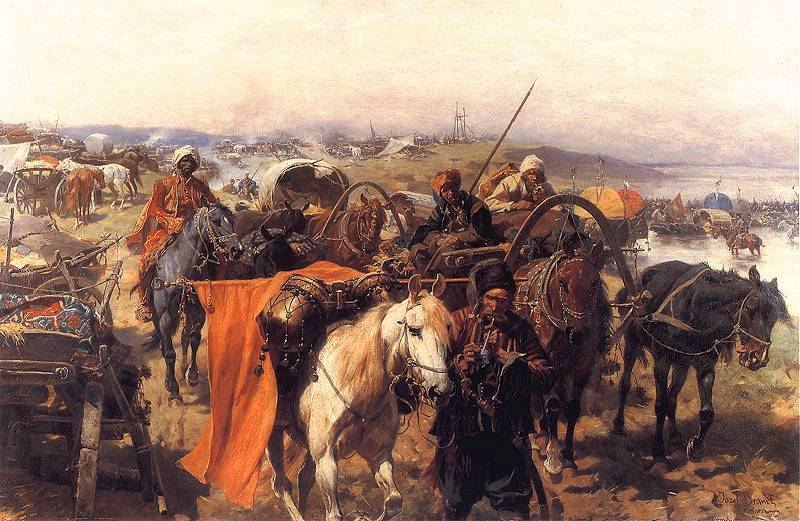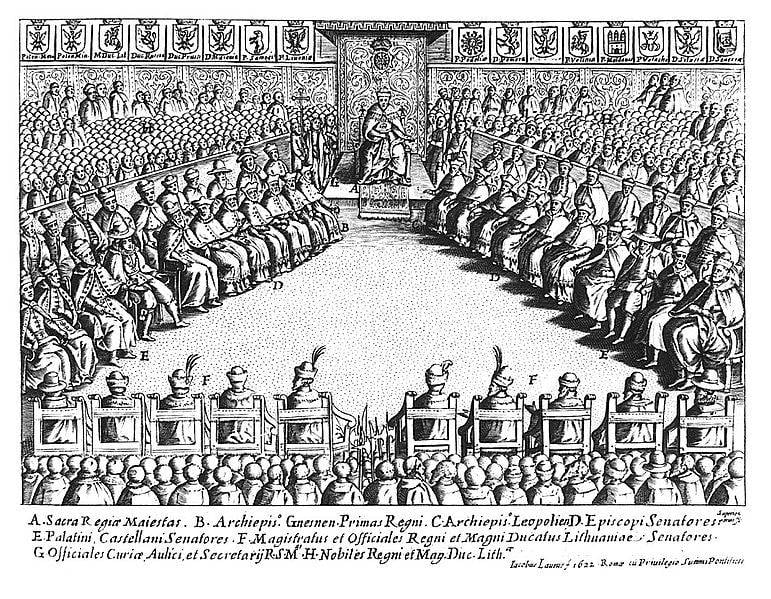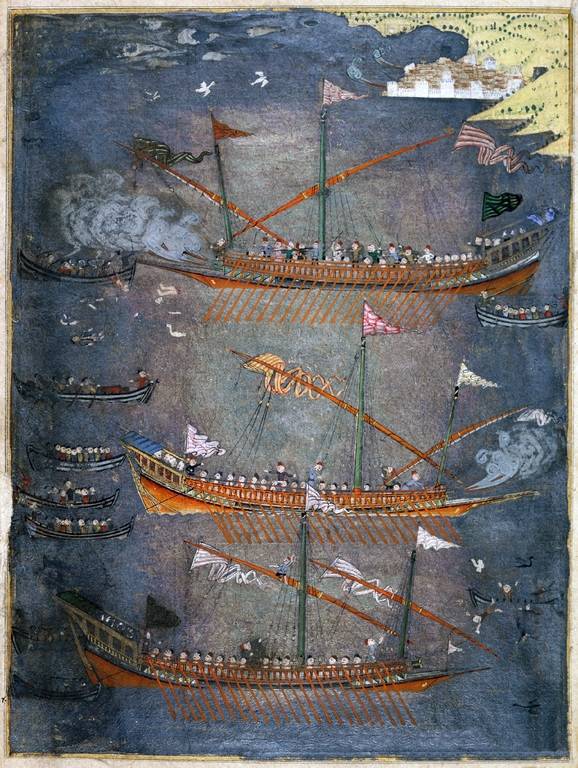Why Russian Ukraine rebelled against gentry democracy

Joseph Brandt. Cossack camp. About 1880
The Russian national liberation war against the Commonwealth was caused by the colonial, parasitic nature of the Polish government. Poland could not digest Russian Ukraine.
Russian Ukraine
The southern and western Russian regions within the Commonwealth, despite the raids of the Crimeans and other steppe predators, were a rich, plentiful land. Fertile fields gave huge harvests of grain crops. Farms, villages and towns were lost in a cloud of blooming gardens. Ponds, streams and rivers were full of fish. On holidays, fun was seething, people walked cheerfully and provocatively. The laid tables were bursting with food, beer, kvass and vodka were pouring. However, there were fewer and fewer celebrations.
The very term "Ukraine", as has been noted more than once, was conditional, it did not mean the territory of the "Ukrainian state" or "Ukrainian people". The word "Ukraine-outskirts" was used in the literal sense. There was Polish Ukraine - the southern outskirts of Poland, Russian Ukraine - the southern border of the Russian kingdom, and the lands beyond the Urals were called Siberian Ukraine. There were many such areas.
The current Ukrainians and Belarusians at that time called themselves "Russians", "Rusyns" and were part of a single Russian ethnic group. The people had a single language (although there were dialects in Little Russia, Novgorod, Pomorie, on the Don, etc.), traditions and culture. This was also implied in faith. Orthodox means Russian, Orthodoxy itself was called the “Russian Faith”.
Gentry democracy
If autocracy was established in Moscow, then in Poland - gentry democracy. Powerful magnates and pans, the gentry (nobles) enjoyed almost unlimited freedom and had a lot of rights that they were ready to defend by force. The main state body was the Sejm, the delegates to it were elected by the gentry at local sejmiks. The Sejm elected kings, expanded the liberties of the pans. The gentry in 1589 achieved the adoption of the principle - "free veto" (Latin liberum veto). This allowed any deputy of the Seimas to stop the discussion of the issue in the Seimas and the work of the Seimas in general, speaking out against it. Laws were to be passed unanimously. The kings could not adopt new laws without the consent of the gentry - the law Nihil novi nisi commune consensu (from Latin - nothing new without universal consent).
Naturally, laws were adopted almost exclusively in the interests of one estate - the gentry (the higher clergy also consisted of representatives of the aristocracy). For the people, such "freedom" of the gentry became a real disaster. The gentry received the exclusive right to own land and real estate. Not only the serfs, but also the former free peasants fell into the full power of the landowner.
The gentry had the right to judge and reprisals on their estates. The rules were set by the owner. The life of a commoner was worth nothing. Any gentry could rob, beat and even kill a peasant. Serfdom was the most rigid in Europe. In Galicia, corvée became daily. In the Kiev region, a peasant with his horse had to work for the landowner 3 days a week.
Extortions in the Commonwealth were also the highest in Europe. In Russia, "tithe", "tenth money" was an emergency tax. In Poland, the peasant annually gave 10% of all property. He also paid a lot of other fees: from beehives, from livestock, for fishing, for grazing cattle, for collecting acorns, for grinding, for marriage and the birth of a child, and a whole series of taxes. If the pan was going to war or decided to arrange a feast, then he spent one-time requisitions.
The magnates and pans lived widely and beautifully, they did not deny themselves anything. The gentry tried in every possible way to imitate them. Feasts, balls and hunting. Seven skins were lowered from the peasants, and the funds obtained were immediately spent on luxury and entertainment. The real parasites on the neck of the people. Ordinary people were reduced to the position of "cattle" - two-legged cattle.
The pans dismantled themselves voivodships and starostvos - local administrative units. They were the local government. In the Russian kingdom, the governor held the post for 2-3 years, then gave the sovereign a countdown. In Poland, the king could not remove the nobleman and demand something from him! The positions of governor and elders became hereditary.
Most cities also fell into private ownership. So, in the Kiev and Bratslav provinces, out of 323 cities and towns, 261 belonged to the nobles. They received many rights, including duty-free shopping. The crown had a monopoly on alcohol, ore mining, potash production. But the royal power also yielded monopolies to the magnates in exchange for some services.
The magnates and panamas needed money all the time. They themselves did not want to engage in their own economy, its development, production and trade. Therefore, they rented out estates to enterprising people, mostly Jews. The Jews were strangers to the local population, collusion and concessions were excluded.
As a result, the tenants squeezed out taxes, and the lords spent money down the drain. But the tenants did not forget themselves. Thus, the common people found themselves under a double economic oppression. Hence such hatred for the Polish lords and "Jews", who were considered enemies of the people, and during riots and uprisings they exterminated everyone who could be caught.

Diet in the reign of Sigismund III Vasa
Free Cossacks
Another scourge of the Commonwealth (including Lithuanian, former Kievan, Rus), in addition to the parasitism of the pans, were the constant raids of the steppes. If in the Russian kingdom they found a method to limit the damage from such a neighborhood - notches, fortified lines, then the king did not have the money, the resource for the construction of powerful and large-scale defensive systems. For the same reason, the standing royal army was small (3-5 thousand fighters). The quartz army was recruited from mercenaries. A quarter of the income (a quarter) from the royal estates was allocated for its maintenance. Hence the name of the army: quartz - that is, a quarter.
Magnates and pans brought their own private armies and squads to war. They could not come, or they could leave of their own accord. The general militia of the gentry, the destruction of the Commonwealth, the king could convene only in case of extreme threat with the consent of the Sejm. It is clear that with such orders it was impossible to repel the swift raids of the Crimean Tatars. When the enemy invaded, the population fled to fortresses and castles, to forests and islands.
The only reliable defenders of the people were the Cossacks. They settled in the Dnieper cities, Kanev, Chigirin, Kyiv, Cherkassy, intercepted steppe predators, fought back full, themselves raided the Ottoman and Crimean possessions. Captured prey, freed Christian slaves. The border governors Vyshnevetsky, Ostrozhsky, Lyantskoronsky, Zaslavsky, who were descended from Russian princely boyar families, but converted to Catholicism, became Polonized, began to organize the Cossacks, became their hetmans. The Cossacks were presented with "bases", fed and armed. So, the nobles received a serious military force that helped protect their possessions.
Under Ivan the Terrible, the Dnieper Cossacks began to recognize the authority of the Russian Tsar. The Polish kings, on the one hand, wanted to destroy the Cossacks as an independent free force. In 1577 the king wrote to the Crimean Khan:
On the other hand, the Poles wanted to subordinate the Cossacks to their will, to use them. The founders of the Registered Cossacks were Kings Sigismund II August and Stefan Batory. The letter of Sigismund II August dated June 5, 1572, handed over to Zaporozhye, offered the Cossacks to enter the royal service, to carry out security service on the southern border.
Registered Cossacks were exempted from paying taxes, gained independence from the local administration and had self-government with their own “Cossack foreman”. Thus, the registered Cossacks, unlike the rest of the common people in the Commonwealth (serfs), received some privileges, they were equated with the nobility of the nobility (without political rights). The king gave the Cossacks military signs, regalia and attributes of power of the Cossack army - banner-banner, bunchuk, mace, ataman's notch-staff, judge's club, colonel's pernach, seal, etc., called Kleinods (from German kleinod - treasure, jewel). Payment for service was made in money, clothing and military supplies.
After the organization of the registered army, the Polish authorities began to recognize as a Cossack only those who were entered in the register. For all others, the pans did not recognize not only Cossack rights, but also the very name "Cossack". They were considered ordinary serfs. Naturally, those who were not included in the register did not want to obey. They moved to the not yet inhabited Zaporozhye (located beyond the rapids of the Dnieper River), built there notches, fortifications - the Sich.
The Sich became the center of the free Cossacks. Here were the laws of the “chivalry brotherhood”. The most severe discipline acted in the campaigns, for crimes they were punished by death. Anyone could come to the Sich, but women were not allowed. The newcomer had to answer two questions: does he believe in the Lord Jesus Christ, the Most Holy Theotokos, and is he ready to fight for the Christian people. The Cossacks took both Poles (Poles) and Tatars, but it was necessary to accept Orthodoxy. Peasants fled to the Dnieper, unable to withstand the arbitrariness of the pans. But not everyone survived here. Some died, others broke, left. The Zaporizhzhya wolves grew up from the rest, an elite military estate.

Cossacks on seagulls (a deckless flat-bottomed boat of the Zaporizhzhya Cossacks of the 1636th–XNUMXth centuries) attack Turkish galleys in the Black Sea. Work by a Turkish author ca. XNUMX British Library
To be continued ...
Information